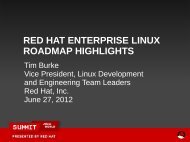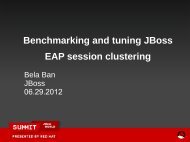Achieving Top Network Performance - Red Hat Summit
Achieving Top Network Performance - Red Hat Summit
Achieving Top Network Performance - Red Hat Summit
Create successful ePaper yourself
Turn your PDF publications into a flip-book with our unique Google optimized e-Paper software.
<strong>Achieving</strong> <strong>Top</strong> <strong>Network</strong><strong>Performance</strong>Mark WagnerPrincipal Engineer, <strong>Red</strong> <strong>Hat</strong> Inc.06.27.12
Not Covered●●●●BondingRHEL5WirelessCoding examples● Some mentions of tips
Take Aways●●●Awareness of the issuesAwareness of toolsGuidelines
Take Aways●You will leave this discussion with:● An understanding of some issues affecting server networkperformance●●Tools to help you evaluate your network performanceSome guidelines to try in your environment
Some Quick Disclaimers●●●We do not recommend one vendor over anotherTest data used is based on “performance mode”●●Maximize a particular thing at the expense of other thingsNot recommended for productionDon't assume settings shown will work for you without some tweaks●Always experiment to find what works best in your environment
Agenda● Why Bother ?● Basic Concepts● RHEL5 -> RHEL6●●●Tuning Knobs and Auto TuningReal World DebugWrap Up
Agenda● Why Bother ?●40 gbit, gluster,latency●Basic Concepts●●●●Pci, cpu, numaOffloads, rdma, solarflare, etcThe Virtual WorldRHEL5 -> RHEL6●Multiqueue, cgroups,steering, sctp, congestion control
Agenda●●●Tunings● Drivers●●● Modinfo, modprobe, ethtoolSysctlApplication, SystemDebug examples● Netperf throughput,Latency,GlusterWrap up
Teaser 1 – Glustereffect of net.core.rmem_max on gluster read throughput1200.00server net.core.wmem_max tuned (4.2 MB) vs untuned (128-KB)read transfer rate (MB/s)1000.00800.00600.00400.00200.000.0032 64 128 256 512 1024 2048 4096client net.core.rmem_max (bytes)tuneduntuned
Teaser 2 – 40 Gbit / sec netperf●Two 40Gbit cards back to back (no switch).# ./netperf -l 30 -H 172.17.200.82TCP STREAM TEST from 0.0.0.0 (0.0.0.0) port 0 AF_INET to172.17.200.82 (172.17.200.82) port 0 AF_INET : spin interval : demoRecv Send SendSocket Socket Message ElapsedSize Size Size Time Throughputbytes bytes bytes secs. 10^6bits/sec87380 16384 16384 30.00 8868.76
Teaser 3 – latency● Font size 28● Font size 26● Font size 22● Font size 28● Font size 26● Font size 22● Font size 28● Font size 26● Font size 22
Basics Concepts●●●●●NUMAPCI busCPU CharacteristicsPower ManagementThe Virtual World
Memory Characteristics●●●Memory Speed is crucial● Faster is betterUnderstand layout and its impact●On middle age systems, fully populating the memory will slow itdownTriple check your BIOS settings● Make sure that you pick settings for optimalperformance
What is NUMA ?●●●NUMA – Non Uniform Memory Architecture●Make bigger systems scalable by distributing systemmemory near individual CPUsNUMA has been around for a long time●●In the past was in specialized high end systemsnow the norm across the board for serversMost current multi-socket systems...●Recent AMD systems have 2 nodes / socket
“Issues” that NUMA makes visible●●System schedulerNon-local memory accesses
“Issues” that NUMA makes visible●●●RHEL6 system scheduler appears biased towardsresponsiveness and optimizing for CPU utilization● It will often align network app on same core as interruptTries to use idle CPUs, regardless of where processmemory is located!Non-local memory accesses have higher accesslatency, which degrades performance
NUMA - Latency[root@perf ~]# numactl --hardwareavailable: 4 nodes (0-3)node 0 cpus: 0 4 8 12 16 20 24 28 32 36 40 44 48 52 56 60node 0 size: 32649 MBnode 0 free: 30868 MBnode 1 cpus: 1 5 9 13 17 21 25 29 33 37 41 45 49 53 57 61node 1 size: 32768 MBnode 1 free: 29483 MBnode 2 cpus: 2 6 10 14 18 22 26 30 34 38 42 46 50 54 58 62node 2 size: 32768 MBnode 2 free: 31082 MBnode 3 cpus: 3 7 11 15 19 23 27 31 35 39 43 47 51 55 59 63node 3 size: 32768 MBnode 3 free: 31255 MBnode distances:node 0 1 2 30: 10 21 21 211: 21 10 21 212: 21 21 10 213: 21 21 21 10
Numa – Latency●Sample inter-NUMA-node relative latency:● Intel 4 socket / 4 node: 1.5x● AMD 4 socket / 8 node: 2.7x● 8 socket / 8 node: 2.8x● 32 node blade system: 5.5x
PCI Bus – and related issues●●●Slot speedMultiple buses / AffinityTools
PCI Bus – and related issues● Make sure that you know the slot speed !●●10 Gbit needs 8X●At least with Gen2● 40 Gbit speeds need PCI-e 3Find if the slot is tied to a specific NUMA node● Know the bindings●Spread the load● Can you change any of the parameters ?● setpci can change some of the parameters●It is tricky and dangerous
40 Gbit Gen3 vs 10 Gbit PCI Gen2 latency10Gb vs 40 Gb qpid RDMA latency test results10 Gb = lines 40Gb = Columnstime milliseconds (lower is better)0.10000.09000.08000.07000.06000.05000.04000.03000.02000.01000.000010K 20K 30K 40K 50K 60K 70KMessage Rate8byte 40Gb 32byte 40Gb 8byte 10Gb 32byte 10Gb
CPU Characteristics – Basics●●●Cache layoutHyperthreadscstates
CPU Characteristics – Basics●●●Understand cache layout● It changes with different chip generations● Try to keep cache lines hotTo use hyperthreads or not● No one stop answer●●cstatesFor latency sensitive probably notFor applications that block a lot probably yes●
CPU – Power related characteristics●●●Variable frequenciesMultiple coresPower saving modes (cpuspeed governors)●●●performanceondemandPowersave
CPU – <strong>Performance</strong> Governors●echo "performance" > \/sys/devices/system/cpu/cpu0/cpufreq/scaling_governor●Best of both worlds – cron jobs to configure thegovernor mode using tuned-adm● tuned-adm profile latency-performance
Power Management– not always your friend●Each HW generation power control evolves●●Trend is towards power savingIs good for the world●BIOS / OS Control● Pstates in BIOS●Cstates in OS
CSTATE default – C7 on this configpk cor CPU %c0 GHz TSC %c1 %c3 %c6 %c7 %pc2 %pc3 %pc6 %pc7 SMIs0.04 1.43 2.19 0.08 0.00 0.00 99.89 4.46 0.00 93.94 0.00 00 0 0 0.41 1.28 2.19 0.93 0.01 0.00 98.66 3.13 0.01 93.91 0.00 00 1 1 0.04 1.66 2.19 0.06 0.00 0.00 99.91 3.13 0.01 93.91 0.00 00 2 2 0.01 1.73 2.19 0.01 0.00 0.00 99.98 3.13 0.01 93.92 0.00 00 3 3 0.01 1.72 2.19 0.02 0.01 0.00 99.96 3.13 0.01 93.92 0.00 00 4 4 0.01 1.85 2.19 0.01 0.00 0.00 99.98 3.13 0.01 93.92 0.00 00 5 5 0.01 1.94 2.19 0.01 0.00 0.00 99.98 3.13 0.01 93.91 0.00 00 6 6 0.01 1.92 2.19 0.02 0.00 0.00 99.98 3.13 0.01 93.91 0.00 00 7 7 0.01 1.76 2.19 0.01 0.00 0.00 99.98 3.13 0.01 93.91 0.00 01 0 8 0.01 1.71 2.19 0.02 0.01 0.00 99.96 5.80 0.00 93.96 0.00 01 1 9 0.01 1.69 2.19 0.02 0.01 0.00 99.97 5.80 0.00 93.96 0.00 01 2 10 0.01 1.75 2.19 0.02 0.00 0.00 99.97 5.80 0.00 93.96 0.00 01 3 11 0.01 1.83 2.19 0.02 0.00 0.00 99.97 5.80 0.00 93.96 0.00 01 4 12 0.01 1.84 2.19 0.02 0.00 0.00 99.97 5.80 0.00 93.96 0.00 01 5 13 0.01 1.91 2.19 0.02 0.00 0.00 99.98 5.80 0.00 93.96 0.00 01 6 14 0.01 1.96 2.19 0.02 0.00 0.00 99.98 5.80 0.00 93.96 0.00 01 7 15 0.01 2.38 2.19 0.03 0.00 0.00 99.96 5.80 0.00 93.96 0.00 0
CSTATE disabled – Note speedpk cor CPU %c0 GHz TSC %c1 %c3 %c6 %c7 %pc2 %pc3 %pc6 %pc7 SMIs100.00 2.69 2.19 0.00 0.00 0.00 0.00 0.00 0.00 0.00 0.00 00 0 0 100.00 2.69 2.19 0.00 0.00 0.00 0.00 0.00 0.00 0.00 0.00 00 1 1 100.00 2.69 2.19 0.00 0.00 0.00 0.00 0.00 0.00 0.00 0.00 00 2 2 100.00 2.69 2.19 0.00 0.00 0.00 0.00 0.00 0.00 0.00 0.00 00 3 3 100.00 2.69 2.19 0.00 0.00 0.00 0.00 0.00 0.00 0.00 0.00 00 4 4 100.00 2.69 2.19 0.00 0.00 0.00 0.00 0.00 0.00 0.00 0.00 00 5 5 100.00 2.69 2.19 0.00 0.00 0.00 0.00 0.00 0.00 0.00 0.00 00 6 6 100.00 2.69 2.19 0.00 0.00 0.00 0.00 0.00 0.00 0.00 0.00 00 7 7 100.00 2.69 2.19 0.00 0.00 0.00 0.00 0.00 0.00 0.00 0.00 01 0 8 100.00 2.69 2.19 0.00 0.00 0.00 0.00 0.00 0.00 0.00 0.00 01 1 9 100.00 2.69 2.19 0.00 0.00 0.00 0.00 0.00 0.00 0.00 0.00 01 2 10 100.00 2.69 2.19 0.00 0.00 0.00 0.00 0.00 0.00 0.00 0.00 01 3 11 100.00 2.69 2.19 0.00 0.00 0.00 0.00 0.00 0.00 0.00 0.00 01 4 12 100.00 2.69 2.19 0.00 0.00 0.00 0.00 0.00 0.00 0.00 0.00 01 5 13 100.00 2.69 2.19 0.00 0.00 0.00 0.00 0.00 0.00 0.00 0.00 01 6 14 100.00 2.69 2.19 0.00 0.00 0.00 0.00 0.00 0.00 0.00 0.00 01 7 15 100.00 2.69 2.19 0.00 0.00 0.00 0.00 0.00 0.00 0.00 0.00 0
NPtcp latency vs cstates – c7 vs c0Impact of Power settings NPtcp Latency resultsMellanox 40 GbitTime in usec (lower is better)30252015105016162745649918925638776510241539306940966147Message SizeC7 usecsC0 usecs
Cstates impact on LatencyImpact of C states on latency - States C0 vs C1Time milliseconds0.09000.08000.07000.06000.05000.04000.03000.02000.01000.000040 Gbit RDMA 256 Byte Message size10K 20K 30K 40K 50K 60K 70K 80K 90KMessage Rate256 byte cstate0 256 byte cstate1
RHEL6 “tuned-adm” profiles# tuned-adm listAvailable profiles:- default- latency-performance- throughput-performance- enterprise-storage- virtual-host, virtual-guest *Example# tuned-adm profile enterprise-storage* NEW for RHEL6.3
tuned profiles – virtual-host/guest new RHEL6.3kernel.sched_min_granularity_nskernel.sched_wakeup_granularity_nsTunable default latencyperformancethroughputperformanceenterprisestoragevirtual-host4ms 10ms 10ms 10ms 10ms4ms 15ms 15ms 15ms 15msvm.dirty_ratio 20% RAM 40% 40% 10% 40%vm.dirty_background_ratio10% RAM 5%vm.swappiness 60 10 30I/O Scheduler(Elevator)FilesystemBarriersvirtual-guestCFQ deadline deadline deadline deadline deadlineOn Off Off OffCPU Governor ondemand performance performanceperformance performance performanceDisk Read-ahead 4x 4x 4x
Kernel Bypass Technologies – Pros and Cons●Multiple Technologies●Some Proprietary● SolarFlare OpenOnload●Coding Changes needed● RDMA
OpenOnload – ThroughputAverage Throughput, netperf<strong>Red</strong> <strong>Hat</strong> Enterprise Lunux 6.2 and Solarflare OpenOnload 201109-u2Avg Throughput (Mbps)1200010000800060004000200009446.22 9446.19 9446.08 9446.22 9446.21 9446.22 9446.22 9446.217904.175407.443436.972158.27695.8 1196.128 16 32 64 128 256 512 1K 2K 4K 8K 16K 32K 64KMessage Size (bytes)TCP Baseline UDP Baseline TCP OpenOnload UDP OpenOnload
Offload – Solarflare OpenOnloadAverage TCP Latency, MRG-M qpid-latency-test<strong>Red</strong> <strong>Hat</strong> Enterprise Linux 6.2 and Solarflare OpenOnload 201109-u2Avg RTT Latency (ms)0.30.250.20.150.10.05010K 20K 30K 40K 50K 60K 70KMessage Rate (K/s)8 Bytes OpenOnload 256 Bytes OpenOnload 1024 Bytes OpenOnload8 Bytes Baseline 256 Bytes Baseline 1024 Bytes Baseline
KVM <strong>Network</strong> Architecture - VirtIO●●Virtual Machine seesparavirtualized network device –VirtIO●●VirtIO drivers included in LinuxKernelVirtIO drivers available forWindows<strong>Network</strong> stack implemented inuserspace
KVM <strong>Network</strong> ArchitectureVirtioContext switch hostkernel userspace
Latency comparison – RHEL 6<strong>Network</strong> Latency virtio400Guest Receive (Lower is better)350Latency (usecs)3002502001504X gap in latencyVirtioHost100500116459925676515394096122852457965536Message Size (Bytes)
KVM <strong>Network</strong> Architecture – vhost_net●●●●●●New in RHEL6.1Moves QEMU network stack fromuserspace to kernelImproved performanceLower Latency<strong>Red</strong>uced context switchingOne less copy
KVM <strong>Network</strong> Architecture – vhost_netvhost_net
Latency comparison – RHEL 6<strong>Network</strong> Latency - vhost_net400Guest Receive (Lower is better)350Latency (usecs)30025020015010050Latency much closerto bare metalVirtioVhost_netHost0119511313871027307581952457965539Message Size (Bytes)
KVM <strong>Network</strong> Architecture – VirtIO vs vhost_netVirtiovhost_net
Host CPU Consumption virtio vs vhost_netTwo columnsis a data setHost CPU Consumption, virtio vs Vhost8 Guests TCP ReceiveMajor differenceis usr time45% Total Host CPU (Lower is Better)403530252015105032-vhost32-vio128-vhost128-vio512-vhost512-vio2048-vhost2048-vio8192-vhost8192-vio32768-vhost32768-vio%usr%soft%guest%sysMessage Size (Bytes)
vhost_net Efficiency4008 Guest Scale Out RX Vhost vs Virtio - % Host CPUMbit per % CPU netperf TCP_STREAMMbit / % CPU (bigger is better)35030025020015010050032641282565121024204840928192163843276865507VhostVirtioMessage Size (Bytes)
KVM <strong>Network</strong> Architecture – PCI DeviceAssignment●●●●●●Physical NIC is passed directly to guestGuest sees real physical device●Needs physical device driverRequires hardware supportIntel VT-D or AMD IOMMULose hardware independence1:1 mapping of NIC to GuestBTW - This also works on some I/O controllers
KVM <strong>Network</strong> Architecture – Device AssignmentDevice Assignment
KVM <strong>Network</strong> Architecture – SR-IOV●●●●●●Single Root I/O VirtualizationNew class of PCI devices that present multiple virtualdevices that appear as regular PCI devicesGuest sees real physical device●Needs physical device driverRequires hardware supportLow overhead, high throughputNo live migrationLose hardware independence
KVM Architecture – SR-IOVSR-IOV
KVM Architecture – Device Assignment vs SR/IOVDevice AssignmentSR-IOV
Latency comparison – RHEL 6 based methods<strong>Network</strong> Latency by guest interface method400Guest Receive (Lower is better)350Latency (usecs)30025020015010050SR-IOV latency closeto bare metalVirtioVhost_netSR-IOVHost0119511313871027307581952457965539Message Size (Bytes)SR-IOV latency close to bare metal
RHEL6 – new features●●●●●●Multi-queue TransmitTools to monitor dropped packetsTraffic SteeringFlow controlDriver improvementsData center bridging DCB● FCoE performance improvements
RHEL6 – new features●●Receive Packet Steering (RPS)● breaks the bottleneck of having to receive networktraffic for a NIC on one CPUReceive Flow Steering (RFS)● allows the optimal CPU to receive network dataintended for a specific application
RHEL6 – new features●●Add getsockopt support for TCP thin-streams● reduce latency from retransmission of lost packets intime-sensitive applicationsAdd Transparent Proxy (TProxy) support for nonlocallybound IPv4 TCP and UDP sockets● similar to Linux 2.2●Allows packet interception and serving of responsewithout client reconfiguration (transparent to client)
Impact of using RPS/RFSImpact of RPS/RFS on CPU Time in Softirq timenote more even distribution, no bottleneck on core 15%softirq CPU Consumption1009080706050403020100Note core 12 is TX IRQ0 1 2 3 4 5 6 7 8 9 10 11 12 13 14 15 16 17 18 19 20 21 22 23CPU Core%soft -no steering%soft -RPS/RFS
Receive Steering – improved message ratesImpact of RPS/RFS on total transactions / sece1000e driver - (Single queue)450000Transactions / sec40000035000030000025000020000015000010000050000No SteeringSteering01 Driver 2 Driverseach driver running 100 concurrent netperf TCP_RR tests
Tuning Knobs – Overview●●Linux networking tuned for reliabilityLinux “autotunes” buffers for connections● Watch BufferBloat !● Don't forget UDP !●Look at documentation in kernel tree
Tuning Knobs – Overview●●●By default, Linux networking not tuned for maxperformance, more for reliability● Remember that Linux “autotunes” buffers forconnections● Don't forget UDP !Try via command line●When you are happy with the results, add to /etc/sysctl.confLook at documentation in /usr/src
sysctl – View and set /proc/sys settings● sysctl -a - lists all variables● sysctl -q - queries a variable● sysctl -w - writes a variable
sysctl – View and set /proc/sys settings● sysctl -w - writes a variable●When setting values, spaces are not allowed●●sysctl -w net.ipv4.conf.lo.arp_filter=0Setting a variable via sysctl on the command line isnot persistent The change is only valid until the nextreboot●Write entries into the /etc/sysctl.conf file to have themapplied at boot time
sysctl – popular settings●●These settings are often mentioned in tuning guidesExperiment but don't take blindly!● net.ipv4.tcp_window_scaling●●●toggles window scalingnet.ipv4.tcp_timestamps●toggles TCP timestamp supportnet.ipv4.tcp_sack●toggles SACK (Selective ACK) support
sysctl – TCP related settings●TCP Memory Allocations - min/pressure/max● net.ipv4.tcp_rmem - TCP read buffer - in bytes●●●overriden by core.rmem_maxnet.ipv4.tcp_wmem - TCP write buffer - in bytes●overridden by core/wmem_maxnet.ipv4.tcp_mem - TCP buffer space● measured in pages, not bytes !
sysctl – ”core” memory settings●CORE memory settings● net.core.(r/w)mem_max●●●●max size of (r/w)x socket buffernet.core.(r/w)mem_default●default (r/w)x size of socket buffernet.core.optmem_max●maximum amount of option memory buffersnet.core.netdev_max_backlog●how many unprocessed rx packets before kernel starts to dropthem● These settings also impact UDP !
Why Bother ? – Teaser 1effect of net.core.rmem_max on gluster read throughput1200.00server net.core.wmem_max tuned (4.2 MB) vs untuned (128-KB)read transfer rate (MB/s)1000.00800.00600.00400.00200.000.0032 64 128 256 512 1024 2048 4096client net.core.rmem_max (bytes)tuneduntuned
Linux auto tuning – It ROCKS!effect of client,server setsockopt(...SO_{SND,RCV}BUF...)iozone -w -c -e -i 1 -+n -r 16384k -s 4g -t 4 -F /mnt/glusterfs/foo{1,2,3,4}.ioz1200.0iozone read transfer rate (MB/s)1000.0800.0600.0400.0200.00.032 64 128 256 512 1024 2048 4096client net.core.{r,w}mem_maxbuffer sizesno Buffer
lspci – details# lspci -vvvs 81:00.081:00.0 Ethernet controller: Mellanox Technologies MT27500 Family [ConnectX-3]Subsystem: Mellanox Technologies Device 0035Control: I/O- Mem+ BusMaster+ SpecCycle- MemWINV- VGASnoop- ParErr+ Stepping- SERR+ FastB2B- DisINTx+Status: Cap+ 66MHz- UDF- FastB2B- ParErr- DEVSEL=fast >TAbort-
Why Bother – A quick teaser●Check MTU# ifconfig eth4eth4 Link encap:Ethernet HWaddr 00:02:C9:36:79:80inet addr:172.17.200.50 Bcast:172.17.200.255Mask:255.255.255.0inet6 addr: fe80::202:c9ff:fe36:7980/64 Scope:LinkUP BROADCAST RUNNING MULTICAST MTU:1500 Metric:1RX packets:2634628 errors:0 dropped:0 overruns:0 frame:0TX packets:31433648 errors:0 dropped:0 overruns:0carrier:0collisions:0 txqueuelen:1000RX bytes:184742056 (176.1 MiB) TX bytes:47590480340(44.3 GiB)
Why Bother – A quick teaser● ifconfig eth0 mtu 9000# ./netperf -l 30 -H 172.17.200.82TCP STREAM TEST from 0.0.0.0 (0.0.0.0) port 0 AF_INET to172.17.200.82 (172.17.200.82) port 0 AF_INET : spin interval : demoRecv Send SendSocket Socket Message ElapsedSize Size Size Time Throughputbytes bytes bytes secs. 10^6bits/sec87380 16384 16384 30.00 23923.65●Changing MTU 9 Gb/sec -> 24 Gbit /sec
Tuning – debug simple netperf TCP_STREAM test● Found the bottleneck !● CPU bound on RX side04:39:33 PM CPU %usr %nice %sys %iowait %irq %soft %steal %guest %idle04:39:36 PM all 0.02 0.00 2.88 0.00 0.00 3.38 0.00 0.00 93.7304:39:36 PM 0 0.00 0.00 0.00 0.00 0.00 0.00 0.00 0.00 100.0004:39:36 PM 1 0.00 0.00 0.00 0.00 0.00 0.00 0.00 0.00 100.0004:39:36 PM 2 0.00 0.00 0.00 0.00 0.00 0.00 0.00 0.00 100.0004:39:36 PM 3 0.00 0.00 0.00 0.00 0.00 0.00 0.00 0.00 100.0004:39:36 PM 4 0.00 0.00 0.00 0.00 0.00 0.00 0.00 0.00 100.0004:39:36 PM 5 0.00 0.00 0.00 0.00 0.00 0.00 0.00 0.00 100.0004:39:36 PM 6 0.00 0.00 0.00 0.00 0.00 0.00 0.00 0.00 100.0004:39:36 PM 7 0.00 0.00 0.00 0.00 0.00 0.00 0.00 0.00 100.0004:39:36 PM 8 0.00 0.00 0.00 0.00 0.00 0.00 0.00 0.00 100.0004:39:36 PM 9 0.00 0.00 0.00 0.00 0.00 0.00 0.00 0.00 100.0004:39:36 PM 10 0.00 0.00 0.00 0.00 0.00 0.00 0.00 0.00 100.0004:39:36 PM 11 0.00 0.00 0.00 0.00 0.00 0.00 0.00 0.00 100.0004:39:36 PM 12 0.00 0.00 0.00 0.00 0.00 0.00 0.00 0.00 100.0004:39:36 PM 13 0.00 0.00 0.00 0.00 0.00 0.00 0.00 0.00 100.0004:39:36 PM 14 0.00 0.00 0.00 0.00 0.00 0.00 0.00 0.00 100.0004:39:36 PM 15 0.33 0.00 45.67 0.00 0.00 54.00 0.00 0.00 0.00
Tuning– first pass bottleneck resolution●●●Disable irqbalance● We will pin the interrupts where we want them● But where do they go ?Look in /sys to see if there are hints●●●A value of -1 could mean error or undefinedIn this case we see that the pci slot is tied to NUMAnode 1Move the interrupts thereAlternative is trial and error
Tuning– first pass bottleneck resolution#dmesg | grep -i numaNUMA: Allocated memnodemap from 9000 - 90c0NUMA: Using 30 for the hash shift.pci_bus 0000:00: on NUMA node 0 (pxm 0)pci_bus 0000:80: on NUMA node 1 (pxm 1)# lspci | grep Mellanox81:00.0 Ethernet controller: Mellanox Technologies MT27500 Family[ConnectX-3]# find /sys -name numa_node | grep 81:00.0/sys/devices/pci0000:80/0000:80:02.0/0000:81:00.0/numa_node# cat /sys/devices/pci0000:80/0000:80:02.0/0000:81:00.0/numa_node1# cat /sys/devices/pci0000:80/0000:80:02.0/0000:81:00.0/local_cpulist8-15
Tuning – second pass setup●●●Disable irqbalance● irqbalance stop●chkconfig irqbalance offIdentify the interrupts●grep eth4 /proc/interruptsBut wait, mlx also has an second driver!●grep mlx /proc/interruptsor# ls /sys/devices/pci0000:80/0000:80:02.0/0000:81:00.0/msi_irqs177 178 179 180 181 182 183 184 185 186 187 188 189190 191 192 193 194 195 196 197●
Tuning – move the interrupts●●●Map the interrupts to the proper cores for the NUMA node●●●CPU cores designated by bitmapUse `numactl –-hardware` to check core mappings tonuma nodesUnderstand the layout of the cache in relationship to thecoresRemember these values do not persistent across reboots!Set IRQ affinity●●echo 80 > /proc/irq/192/smp_affinityUse “tuna'
Tuning – irqbalance disabled, netperf pinning● Rerun the tests, pin the netperf TX and RX to core 12# ./netperf -l 30 -H 172.17.200.82 -T 12,12TCP STREAM TEST from 0.0.0.0 (0.0.0.0) port 0 AF_INETto 172.17.200.82 (172.17.200.82) port 0 AF_INET : spininterval : demo : cpu bindRecv Send SendSocket Socket Message ElapsedSize Size Size Time Throughputbytes bytes bytes secs. 10^6bits/sec87380 16384 16384 30.00 25609.34●Hmmm, not really much better
Tuning – second pass●mpstat on the receiver11:45:04 PM CPU %usr %nice %sys %iowait %irq %soft %steal %guest %idle11:45:07 PM all 0.02 0.00 5.02 0.00 0.00 0.02 0.00 0.00 94.9411:45:07 PM 0 0.00 0.00 0.00 0.00 0.00 0.00 0.00 0.00 100.0011:45:07 PM 1 0.00 0.00 0.00 0.00 0.00 0.00 0.00 0.00 100.0011:45:07 PM 2 0.00 0.00 0.00 0.00 0.00 0.00 0.00 0.00 100.0011:45:07 PM 3 0.00 0.00 0.00 0.00 0.00 0.00 0.00 0.00 100.0011:45:07 PM 4 0.00 0.00 0.00 0.00 0.00 0.00 0.00 0.00 100.0011:45:07 PM 5 0.00 0.00 0.00 0.00 0.00 0.00 0.00 0.00 100.0011:45:07 PM 6 0.00 0.00 0.00 0.00 0.00 0.00 0.00 0.00 100.0011:45:07 PM 7 0.00 0.00 0.00 0.00 0.00 0.00 0.00 0.00 100.0011:45:07 PM 8 0.00 0.00 0.00 0.00 0.00 0.00 0.00 0.00 100.0011:45:07 PM 9 0.00 0.00 0.00 0.00 0.00 0.00 0.00 0.00 100.0011:45:07 PM 10 0.00 0.00 0.00 0.00 0.00 0.00 0.00 0.00 100.0011:45:07 PM 11 0.00 0.00 0.00 0.00 0.00 0.00 0.00 0.00 100.0011:45:07 PM 12 0.33 0.00 77.08 0.00 0.00 0.66 0.00 0.00 21.9311:45:07 PM 13 0.00 0.00 0.00 0.00 0.00 0.00 0.00 0.00 100.0011:45:07 PM 14 0.00 0.00 0.00 0.00 0.00 0.00 0.00 0.00 100.0011:45:07 PM 15 0.00 0.00 0.00 0.00 0.00 0.00 0.00 0.00 100.00
Tuning – second pass●mpstat on the transmit11:45:03 PM CPU %usr %nice %sys %iowait %irq %soft %steal %guest %idle● 11:45:06 PM all 0.08 0.00 3.52 0.00 0.00 0.19 0.00 0.00 96.20● 11:45:06 PM 0 0.33 0.00 0.00 0.00 0.00 0.00 0.00 0.00 99.67● 11:45:06 PM 1 0.00 0.00 0.00 0.00 0.00 0.00 0.00 0.00 100.00● 11:45:06 PM 2 0.00 0.00 0.00 0.00 0.00 0.00 0.00 0.00 100.00● 11:45:06 PM 3 0.00 0.00 0.00 0.00 0.00 0.00 0.00 0.00 100.00● 11:45:06 PM 4 0.00 0.00 0.00 0.00 0.00 0.00 0.00 0.00 100.00● 11:45:06 PM 5 0.00 0.00 0.00 0.00 0.00 0.00 0.00 0.00 100.00● 11:45:06 PM 6 0.00 0.00 0.00 0.00 0.00 0.00 0.00 0.00 100.00● 11:45:06 PM 7 0.00 0.00 0.00 0.00 0.00 0.00 0.00 0.00 100.00● 11:45:06 PM 8 0.00 0.00 0.00 0.00 0.00 0.00 0.00 0.00 100.00● 11:45:06 PM 9 0.00 0.00 0.00 0.00 0.00 0.00 0.00 0.00 100.00● 11:45:06 PM 10 0.00 0.00 0.00 0.00 0.00 0.43 0.00 0.00 99.57● 11:45:06 PM 11 0.00 0.00 0.00 0.00 0.00 0.34 0.00 0.00 99.66● 11:45:06 PM 12 0.70 0.00 57.49 0.00 0.00 2.44 0.00 0.00 39.37● 11:45:06 PM 13 0.00 0.00 0.00 0.00 0.00 0.00 0.00 0.00 100.00● 11:45:06 PM 14 0.00 0.00 0.33 0.00 0.00 0.00 0.00 0.00 99.67● 11:45:06 PM 15 0.00 0.00 0.00 0.00 0.00 0.00 0.00 0.00 100.00
Tuning – step 2 not clear●●No apparent cpu bottleneckLets try looking at process# perf top -p 37590Events: 14K cycles27.04% [kernel] [k] copy_user_generic_string6.01% [kernel] [k] alloc_pages_current5.61% [kernel] [k] __alloc_pages_nodemask4.87% [kernel] [k] get_page_from_freelist4.54% [kernel] [k] tcp_sendmsg2.36% [kernel] [k] put_page2.13% [kernel] [k] list_del●netperf is spending a lot of time generating data
Tuning – step 3●Try TCP_SENDFILE# ./netperf -l 30 -H 172.17.200.82 -T 12,12 -tTCP_SENDFILETCP SENDFILE TEST from 0.0.0.0 (0.0.0.0) port 0 AF_INETto 172.17.200.82 (172.17.200.82) port 0 AF_INET : spininterval : demo : cpu bindRecv Send SendSocket Socket Message ElapsedSize Size Size Time Throughputbytes bytes bytes secs. 10^6bits/sec87380 16384 16384 30.00 34106.58● Looking Better !
Tuning – are we done ?●Look for bottlenecks● Transmit is CPU bound● 11:54:54 PM CPU %usr %nice %sys %iowait %irq %soft %steal %guest %idle● 11:54:57 PM all 0.08 0.00 6.16 0.00 0.00 0.11 0.00 0.00 93.65● 11:54:57 PM 0 0.33 0.00 0.33 0.00 0.00 0.00 0.00 0.00 99.34● 11:54:57 PM 1 0.00 0.00 0.00 0.00 0.00 0.00 0.00 0.00 100.00● 11:54:57 PM 2 0.33 0.00 0.00 0.00 0.00 0.00 0.00 0.00 99.67● 11:54:57 PM 3 0.00 0.00 0.00 0.00 0.00 0.00 0.00 0.00 100.00● 11:54:57 PM 4 0.00 0.00 0.00 0.00 0.00 0.00 0.00 0.00 100.00● 11:54:57 PM 5 0.00 0.00 0.00 0.00 0.00 0.00 0.00 0.00 100.00● 11:54:57 PM 6 0.00 0.00 0.00 0.00 0.00 0.00 0.00 0.00 100.00● 11:54:57 PM 7 0.00 0.00 0.00 0.00 0.00 0.00 0.00 0.00 100.00● 11:54:57 PM 8 0.00 0.00 0.00 0.00 0.00 0.00 0.00 0.00 100.00● 11:54:57 PM 9 0.00 0.00 0.00 0.00 0.00 0.00 0.00 0.00 100.00● 11:54:57 PM 10 0.00 0.00 0.00 0.00 0.00 0.39 0.00 0.00 99.61● 11:54:57 PM 11 0.00 0.00 0.00 0.00 0.00 0.00 0.00 0.00 100.00● 11:54:57 PM 12 1.00 0.00 97.66 0.00 0.00 1.34 0.00 0.00 0.00● 11:54:57 PM 13 0.00 0.00 0.00 0.00 0.00 0.00 0.00 0.00 100.00● 11:54:57 PM 14 0.00 0.00 0.00 0.00 0.00 0.00 0.00 0.00 100.00● 11:54:57 PM 15 0.00 0.00 0.00 0.00 0.00 0.00 0.00 0.00 100.00
Tuning – checking ethtool -S eth4●●Check for errors, pause frames, etc.Check nic on TX side# ethtool -S eth4NIC statistics:rx_packets: 135224755tx_packets: 1137704051rx_bytes: 8729946637tx_bytes: 9906371184752rx_errors: 0tx_errors: 0rx_dropped: 0tx_dropped: 0tso_packets: 20844101queue_stopped: 92899164wake_queue: 92899164
Tuning – sysctl settings●We need more buffers● net.core.netdev_max_backlog = 250000● net.core.wmem_max = 16777216● net.core.rmem_default = 16777216● net.core.wmem_default = 16777216● net.core.optmem_max = 16777216● net.ipv4.tcp_mem = 16777216 16777216 16777216● net.ipv4.tcp_rmem = 4096 87380 16777216● net.ipv4.tcp_wmem = 4096 65536 16777216● net.core.rmem_max = 16777216
Tuning – step 4●More buffers# ./netperf -l 30 -H 172.17.200.82 -T 12,12 -tTCP_SENDFILETCP SENDFILE TEST from 0.0.0.0 (0.0.0.0) port 0 AF_INETto 172.17.200.82 (172.17.200.82) port 0 AF_INET : spininterval : demo : cpu bindRecv Send SendSocket Socket Message ElapsedSize Size Size Time Throughputbytes bytes bytes secs. 10^6bits/sec87380 16384 16384 30.00 37354.41● We are done !
Tuning – throughput graph40 Gbit Ethernet <strong>Performance</strong>Tuned single stream TCP_STREAMThroughput (Mbits / sec)400003500030000250002000015000100005000032 64 128 256 512 1024 2048 4096 8192 16384 32768 65507Message SizeThroughput (Mbits / sec)
Tuning – sanity check●Sometimes mistuning can show that it is working# ./netperf -l 30 -H 172.17.200.82 -T 12,2 -t TCP_SENDFILETCP SENDFILE TEST from 0.0.0.0 (0.0.0.0) port 0 AF_INET to172.17.200.82 (172.17.200.82) port 0 AF_INET : spin interval : demo :cpu bindRecv Send SendSocket Socket Message ElapsedSize Size Size Time Throughputbytes bytes bytes secs. 10^6bits/sec87380 16384 16384 30.00 13033.89●37 Gb -> 13 Gb due to crossing NUMA boundary● OUCH !
Throttling – cgroups●●●●Control Group (Cgroups) for● CPU/Memory/<strong>Network</strong>/DiskBenefit:● guarantee Quality of Service●dynamic resource allocationIdeal for managing any multi-application environmentFrom back-ups to the Cloud
Throttling – cgroups in Action
cgroups Architecture
Cgroup default mount points# cat /etc/cgconfig.confmount {cpuset = /cgroup/cpuset;cpu = /cgroup/cpu;cpuacct = /cgroup/cpuacct;memory = /cgroup/memory;devices = /cgroup/devices;freezer = /cgroup/freezer;net_cls = /cgroup/net_cls;blkio = /cgroup/blkio;}# ls -l /cgroupdrwxr-xr-x 2 root root 0 Jun 21 13:33 blkiodrwxr-xr-x 3 root root 0 Jun 21 13:33 cpudrwxr-xr-x 3 root root 0 Jun 21 13:33 cpuacctdrwxr-xr-x 3 root root 0 Jun 21 13:33 cpusetdrwxr-xr-x 3 root root 0 Jun 21 13:33 devicesdrwxr-xr-x 3 root root 0 Jun 21 13:33 freezerdrwxr-xr-x 3 root root 0 Jun 21 13:33 memorydrwxr-xr-x 2 root root 0 Jun 21 13:33 net_cls
Cgroup how-to1GB/2CPU subset of a 16GB/8CPU system#numactl --hardware#mount -t cgroup xxx /cgroups#mkdir -p /cgroups/test#cd /cgroups/test#echo 1 > cpuset.mems#echo 2-3 > cpuset.cpus#echo 1G > memory.limit_in_bytes#echo $$ > tasks
cgroups[root@dhcp1001950 ~]# forkoff 20MB 100procs &[root@dhcp1001950 ~]# top d 5top 12:24:13 up 1:36, 4 users, load average: 22.70, 5.32, 1.79Tasks: 315 total, 93 running, 222 sleeping, 0 stopped, 0 zombieCpu0 : 0.0%us, 0.2%sy, 0.0%ni, 99.8%id, 0.0%wa, 0.0%hi, 0.0%si, 0.0%stCpu1 : 0.0%us, 0.2%sy, 0.0%ni, 99.8%id, 0.0%wa, 0.0%hi, 0.0%si, 0.0%stCpu2 :100.0%us, 0.0%sy, 0.0%ni, 0.0%id, 0.0%wa, 0.0%hi, 0.0%si, 0.0%stCpu3 : 89.6%us, 10.0%sy, 0.0%ni, 0.0%id, 0.0%wa, 0.2%hi, 0.2%si, 0.0%stCpu4 : 0.4%us, 0.6%sy, 0.0%ni, 98.8%id, 0.0%wa, 0.0%hi, 0.2%si, 0.0%stCpu5 : 0.4%us, 0.0%sy, 0.0%ni, 99.2%id, 0.0%wa, 0.0%hi, 0.4%si, 0.0%stCpu6 : 0.0%us, 0.0%sy, 0.0%ni,100.0%id, 0.0%wa, 0.0%hi, 0.0%si, 0.0%stCpu7 : 0.0%us, 0.0%sy, 0.0%ni, 99.8%id, 0.0%wa, 0.0%hi, 0.2%si, 0.0%stMem: 16469476k total, 1993064k used, 14476412k free,33740k buffersSwap: 2031608k total, 185404k used, 1846204k free, 459644k cached
Verify correct bindings[root@dhcp47-183 test]# echo 0 > cpuset.mems[root@dhcp47-183 test]# echo 0-3 > cpuset.cpus[root@dhcp47-183 test]# numastatnode0 node1numa_hit 1648772 438778numa_miss 23459 2134520local_node 1648648 423162other_node 23583 2150136[root@dhcp47-183 test]# /common/lwoodman/code/memory 4faulting took 1.616062stouching took 0.364937s[root@dhcp47-183 test]# numastatnode0 node1numa_hit 2700423 439550numa_miss 23459 2134520local_node 2700299 423934other_node 23583 2150136
incorrect bindings![root@dhcp47-183 test]# echo 1 > cpuset.mems[root@dhcp47-183 test]# echo 0-3 > cpuset.cpus[root@dhcp47-183 test]# numastatnode0 node1numa_hit 1623318 434106numa_miss 23459 1082458local_node 1623194 418490other_node 23583 1098074[root@dhcp47-183 test]# /common/lwoodman/code/memory 4faulting took 1.976627stouching took 0.454322s[root@dhcp47-183 test]# numastatnode0 node1numa_hit 1623341 434147numa_miss 23459 2133738local_node 1623217 418531other_node 23583 2149354
Throttle with cgroups●Example:● Set a 9 Gbit / sec limit on the cgroup# tc qdisc add dev eth1 root handle 10: htb default 10# tc class add dev eth1 parent 10:10 classid 10:10 htb rate 9gbit ceil 9gbit# tc filter add dev eth1 parent 10:0 protocol all prio 1 handle 1 cgroup# echo 0x100010 > /cgroup/net_cls/net_cls.classid
Throttle with cgroups●●memory● associate a cgroup with a classid that 'tc' utilitycreates/manages●Set upper-boundsExample:● Set a 9 Gbit / sec limit on the cgroup# tc qdisc add dev eth1 root handle 10: htb default 10# tc class add dev eth1 parent 10:10 classid 10:10 htb rate 9gbit ceil 9gbit# tc filter add dev eth1 parent 10:0 protocol all prio 1 handle 1 cgroup# echo 0x100010 > /cgroup/net_cls/net_cls.classid
<strong>Network</strong> Tuning Tips●●●●Packet size - MTUBuffersIRQ affinityCPU affinity
<strong>Network</strong> Tuning Tips●Separate networks for different functions●Use arp_filter to prevent ARP Flux●●echo 1 > /proc/sys/net/ipv4/conf/all/arp_filterUse /etc/sysctl.conf for permanent
Wrap UP●Use this talk as suggestions of things to try● Our work is based on a private, local network – wide areanetwork will be different●●Do not assume “my” setting will work for you without sometweaksYour environment is probably different then mine.● Experiment ! (but be careful )●I should be around the <strong>Summit</strong> for the remainder of the week.●Feel free to stop me and ask questions, provide feedback,etc●There will be members of the <strong>Performance</strong> team in the booth
For More Information – Other talks●<strong>Performance</strong> Analysis & Tuning of <strong>Red</strong> <strong>Hat</strong> EnterpriseLinux – Shak and Larry● Part 1 - Thurs 2:30● Part 2 - Thurs 3:40●●Tuning <strong>Red</strong> <strong>Hat</strong> Systems for Databases - Sanjay Rao● Thurs 4:50<strong>Red</strong> <strong>Hat</strong> Storage <strong>Performance</strong> - Ben England● Fri 9:45
For More Information●●●●Reference Architecture Website●https://access.redhat.com/knowledge/refarch/TBDPrincipled Technologies●http://www.principledtechnologies.com/clients/reports/<strong>Red</strong>%20<strong>Hat</strong>/<strong>Red</strong>%20<strong>Hat</strong>.htmNew edition of the “<strong>Performance</strong> Tuning Guide”●http://docs.redhat.com/docs/en-US/<strong>Red</strong>_<strong>Hat</strong>_Enterprise_Linux/index.htmlIRQ Balance paper●https://access.redhat.com/knowledge/techbriefs/optimizing-red-hat-enterprise-linuxperformance-tuning-irq-affinity
Stay connected through the <strong>Red</strong> <strong>Hat</strong> Customer PortalRHEL 6 <strong>Network</strong> <strong>Performance</strong>Watch video<strong>Performance</strong> Issues in <strong>Red</strong> <strong>Hat</strong> EnterpriseLinux (Part 3)Review Tech briefJoin <strong>Red</strong> <strong>Hat</strong> Enterprise LinuxJoin Groupaccess.redhat.com
Tools – Hardware / Driver Focus●●●●lspciethtoolmodinfohwloc
Configuration Tools – System Level●●●●●●●numactltunaifconfig / iptccgroupssysctlman
Monitoring Tools – System Level●●●●●●●●●numstatmpstatvmstatwatchtcpdump / wiresharknetstatoprofile / perfsariptraf
sar – some common flags●Some common flags for sar●Adding E gets failure stats● # sar -n EDEV - View failure statistics for interfaces● # sar -n NFS - View NFS client activity for interfaces● # sar -n NFSD - View NFS server activity for interfaces● # sar -n (E)IP - View IPv4 activity for interfaces● # sar -n (E)ICMP - View ICMPv4 activity for interfaces● # sar -n (E)TCP - View TCPv4 activity for interfaces
ethtool – View and change Ethernet card settings●Works mostly at the HW level●●●●●ethtool -S – provides HW level stats●Counters since boot time, create scripts to calculate diffsethtool -c - Interrupt coalescingethtool -g - provides ring buffer informationethtool -k - provides hw assist informationethtool -i - provides the driver information

















